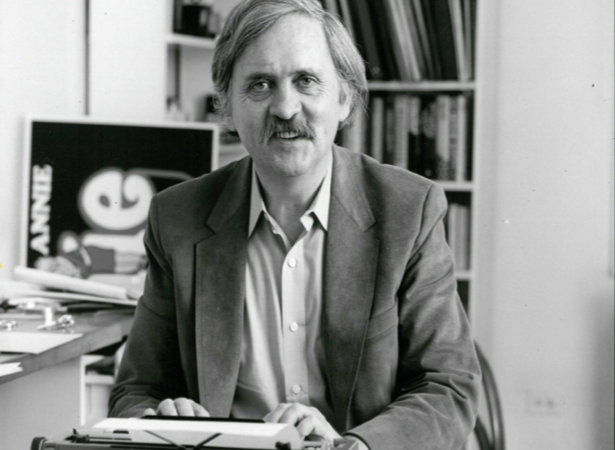
Playwright Thomas Meehan was a Hamilton graduate of the Class of 1951. Photo courtesy of the Hamilton College Archives.
In honor of the Hamilton Archives receiving an annotated manuscript of the hit Broadway musical “Annie,” it seemed fitting to shine a light on playwright Thomas Meehan ’51. The three-time Tony Award-winning writer grew up in in Ossining, N.Y. as the son of a nurse and businessman. He majored in English at Hamilton College, worked for
The Spectator
, played basketball and was a member of Theta Delti Chi, where he was known for his party spirit. Meehan’s first published sentence was “somewhere down the street, someone dropped a milk bottle,” which appeared in
The Continental
in 1950. Meehan’s yearbook biography states that his interests include “contemporary literature, music, women, and the contents of bottles. Getting a maximum of success with a minimum of effort from his academic endeavors, the Coach has played football, basketball, and vanquished the best poke players Hamilton has to offer.”
For Meehan, Hamilton opened up a huge window into another world that he had not experienced before. He discovered serious music, different types of literature and found all sorts of “marvelous treasure.” He credited Hamilton for teaching him the foundations of writing, the very slow process of practicing over and over again until the writing finally clicked for him. He advised writers that “to do a great deal of reading in all kinds of areas; all kinds of reading; everything…all areas and all histories and all cultures [are] very important to a writer. Really if you’re serious about writing you should know what’s been written.” Meehan fell in love with William Faulkner’s work and tried to write like he did, but veered into comedy instead. He also wrote and starred in a comedic Hamilton show, which would be his last stage appearance. Grateful for his time on the Hill, Meehan would later establish the Thomas E. Meehan Prize in Creative Writing, which is given out each spring.
When reflecting on his time at Hamilton, Meehan hoped that the College maintained its standards. He advocated for a liberal education, claiming that it is the most valuable thing that anybody can have in this world. He felt that if “you go through college and you just learn to work the computer or any kind of specialization, you really aren’t getting what college should offer a person. Those 4 years should be spent in looking into all kinds of areas and exploring and finding yourself.” He greatly enjoyed the small class sizes, which he believed fostered intimacy and a special, personal connection. To Meehan, Hamilton became a sort of second home; perhaps that is why, he thinks, so many Hamilton graduates return to the Hill. He credits the feeling of isolation on the Hill, especially in the cold winter, for creating such a close bond among students and faculty — the “monastic sort of life where you’re involved with learning, drinking beer and chasing girls, but still, there’s a lot of chance for contemplation and thinking and exploring and becoming truly educated.”
After graduating from Hamilton, Meehan served in the Army and then began his career as the writer for the
New Yorker
. When asked about the source of his humor Meehan replied, “I don’t know. They say humor has a lot of hostility. I probably do but I’ve traveled so much that I don’t really have any left. I came from a sort of witty family. My father was a very witty man; my mother was witty. It may be some kind of Irish tale-telling tradition of humor.” His 1962 short story “Yma Dream” caught the attention of actors Anne Bancroft and Mel Brooks who worked with Meehan to create a television sketch comedy that earned an Emmy award. A decade later, Meehan was approached to adapt the comic strip “Little Orphan Annie” into a musical. Despite initial hesitation, Meehan accepted the project and received the first of his Tony Awards.
Meehan stated that his time at Hamilton influenced his inspiration for
Annie
. As a student, he was quite interested in history, particularly the history of 20th century America and the Roosevelt era. For Meehan, the character Annie served as a metaphor for the goodness, honesty and integrity of the government — values that he believed Franklin D. Roosevelt embodied. Meehan conducted a lot of research for
Annie
by searching through libraries and becoming familiar with 1933 and the slang used at that time. He valued historical accuracy in plays and hated movies where actors used the wrong slang, feeling that it was a “violation of some kind of principle of reality.” Overall, Meehan’s liberal arts education both inspired and bolstered his stage adaptation for
Annie
.
After
Annie
, Meehan and Mel Brooks would also work together to create
The Producers
, a 2001 Broadway hit that would win 13 Tony Awards. In 2002, Meehan worked with author Mark O’Donnell to make a stage adaptation of
Hairspray
which would earn Meehan his second Tony award. In total, Meehan holds the distinction of having three productions running simultaneously on Broadway (
Annie
,
Elf
and
Chaplin
), and he is the only writer of the books for three Broadway shows that ran for over 2,000 performances (
Annie
,
The Producers
and
Hairspray
).
Meehan died in August 2017 in his home in Greenwich village at 88 years old. He had two children, three step-children and six grandchildren. He will be remembered as an iconic Broadway writer, a lover of the arts and a beloved Hamilton alumnus.